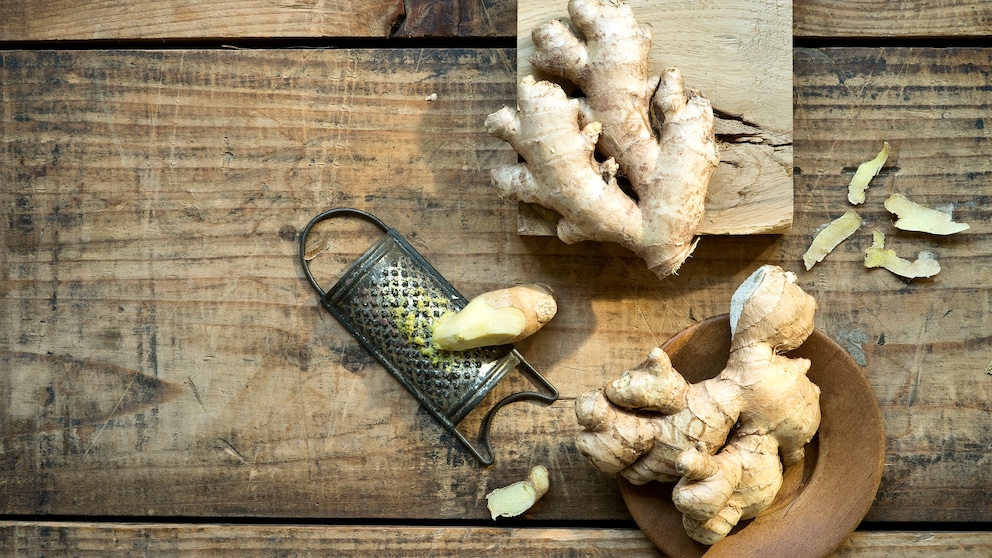December 23, 2024, 2:17 pm | Read time: 4 minutes
You are probably familiar with ginger from Asian cuisine. The tuber is popular there due to its juicy spiciness. However, in addition to being tasty, ginger is also healthy. For example, it is often used with hot water and honey as a ginger tea to help with colds. But did you know that ginger can also help with hair care, especially dandruff and hair loss?
Things are heating up – and not just in the kitchen! Let’s talk about hair care and the zesty twist ginger oil is adding to our routines. Ginger oil is the latest ingredient spicing up the hair care scene. But the burning question is, does it live up to the hype? And what is it actually good for?
Overview
What is Ginger Oil?
Originating from tropical regions, ginger is a plant with a long history of culinary and medicinal uses. The rhizome of the ginger plant, hailing from Indonesia, India, and China, serves a dual purpose as both a flavorful spice and a traditional remedy. Ginger owes its intense flavor to pungent compounds called gingerols. In addition to its bold taste, ginger is packed with antioxidants and boasts anti-inflammatory properties. It’s a versatile root that not only eases nausea but also soothes inflammation and aids digestion.
To create ginger oil, you start by finely grating the ginger before blending it with oil. For hair care, nourishing oils like jojoba or olive oil are particularly beneficial. However, you can also opt for odorless oils if you prefer a more neutral scent.
Recipe for Homemade Ginger Oil
If you want to make your own ginger oil, you can do this at home. The best way to do this is to soak the grated ginger in the selected oil overnight. One teaspoon of ginger and a few teaspoons of oil are enough. For an extra ginger kick, combine the grated or pressed ginger with the oil in a jar, seal it tightly, and let it infuse for about two weeks.
How is the Oil Used in Hair Care?
Ginger oil can be a game-changer in your hair conditioning routine. Simply shampoo your hair, then work the oil through your strands. Allow it to penetrate for some time before thoroughly rinsing it out. As a deep treatment, ginger oil’s effects are even more profound. Massage the oil into your hair and scalp and leave it on overnight. To protect your sheets, wrap a towel around them or use a shower cap. This approach not only keeps your sheets clean but may also enhance the oil’s potency. The next day, wash your hair as usual.
Expert Explains How Ginger Oil Affects Hair and Scalp
The real treasure of ginger oil in hair care lies in its rich antioxidant content. Antioxidants protect the hair from free radicals and make it stronger. Supported by the oil, your hair can achieve a shinier and more radiant appearance.
Dermatologist Dr. Timm Golüke told STYLEBOOK: “Ginger oil is very good for the hair. It has an antioxidant effect, which means it can neutralize free radicals and stabilize the scalp’s microbiome.” This strengthens the hair and soothes the scalp, which in turn can counteract dandruff.
The expert also reveals that ginger oil boosts blood circulation. “Ginger oil strengthens the hair root. This is also the reason why caffeine and ginko are used in hair care.” Like ginger oil, these two active ingredients also have a stimulating effect. Enhanced blood flow and fortified hair follicles contribute to healthier hair growth and reduced hair loss.

According to Calculations, This Actor Is “the Most Beautiful Man in the World”

Why Every Hairdryer Has a Cold Setting — and Why You Should Use It

The Best Pistachio Perfumes for Every Budget
Possible Risks of Use
Anyone who’s tasted or smelled ginger knows it packs a spicy punch. So, if your scalp is on the sensitive side, it’s wise to use ginger oil with caution. The dermatologist recommends that individuals with allergies first test the oil on a small, discreet area to gauge their skin’s response. “If you don’t react to it, ginger oil can then be applied to the entire scalp.”
However, to avoid irritating your hair and scalp, it’s best to limit the use of this potent tincture to once a week in your hair care regimen.

